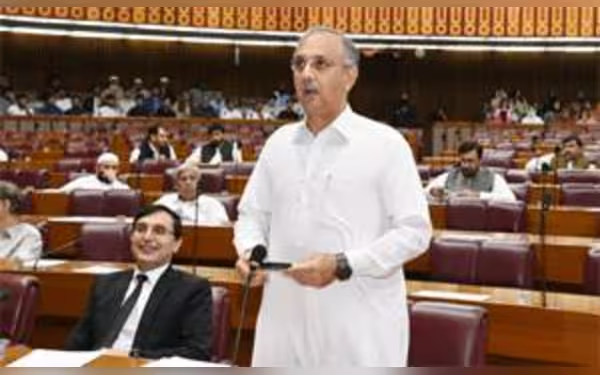Saturday, November 16, 2024 05:42 PM
Ruling Coalition Proposes Controversial Constitutional Package in Pakistan Senate
- Constitutional Package aims to establish a separate court.
- Proposal seeks to amend Article 63-A regarding party directives.
- Government faces opposition over transparency and majority concerns.
 Image Credits: nation_pk
Image Credits: nation_pkThe ruling coalition in Pakistan unveils a controversial constitutional package in the Senate, aiming for judicial reforms and addressing party directives.
In a significant development, the ruling coalition in Pakistan has presented the details of its much-debated "Constitutional Package" in the Senate. This package aims to introduce a constitutional court and reverse a Supreme Court ruling that prevents lawmakers from voting while switching parties. The proposal also includes a provision for the current Chief Election Commissioner (CEC) and members of the Election Commission of Pakistan (ECP) to remain in their positions until their successors are appointed.
During the Senate session, Deputy Prime Minister Ishaq Dar emphasized the government's commitment to establishing a separate constitutional court, which he believes will alleviate the burden on the Supreme Court, where approximately 60,000 cases are pending. He pointed out that 25 percent of these cases are constitutional petitions, indicating a pressing need for reform. Dar referenced Article 4 of the Constitution, which he argued supports the formation of such a court, a concept that was also part of the Charter of Democracy signed by the Pakistan Muslim League-Nawaz (PML-N) and the Pakistan Peoples Party (PPP) in 2006.
Dar expressed frustration over the opposition's claims that the government was withholding information regarding the constitutional amendment bill. He stated, "We want to fix this problem which has been pending for 18 years … and why not if we can divide this workload (of the SC). It is never too late." However, the Senate session was adjourned without the bill being tabled, raising questions about whether the ruling coalition possesses the necessary two-thirds majority in both houses of Parliament.
In response to concerns raised by the opposition, Dar clarified that the government was open to withdrawing a proposal to extend the retirement age of judges, a suggestion made by Jamiat Ulema-e-Islam-Fazl (JUI-F) chief Maulana Fazlur Rehman. He noted that the meeting had a consensus against extending the age if it was perceived as favoring specific individuals.
Another key aspect of the proposed package is the amendment to Article 63-A of the Constitution. This amendment seeks to overturn a Supreme Court decision that penalizes lawmakers who defy party directives by crossing the floor. Dar criticized this ruling, stating that it was unjust for a lawmaker to lose their membership for an action they did not commit. He invited the opposition to collaborate on judicial reforms to enhance the justice system's efficiency and accessibility.
On the other hand, Leader of the Opposition in the Senate, Shibli Faraz, accused the ruling coalition of concealing the details of the constitutional amendment bill from lawmakers, which he argued is against parliamentary norms. He claimed that the government lacks the two-thirds majority needed to pass the bill and is pressuring PTI members to switch allegiances. Faraz expressed concern over the government's haste in pushing through constitutional changes without adequate consultation with allies and opposition members.
As the political landscape in Pakistan continues to evolve, the proposed "Constitutional Package" raises critical questions about governance, accountability, and the future of democratic processes in the country. The ongoing discussions and debates surrounding this package will undoubtedly shape the political discourse in Pakistan for years to come. It remains to be seen how the ruling coalition will navigate the challenges ahead and whether they can achieve the necessary consensus to implement these significant constitutional changes.













